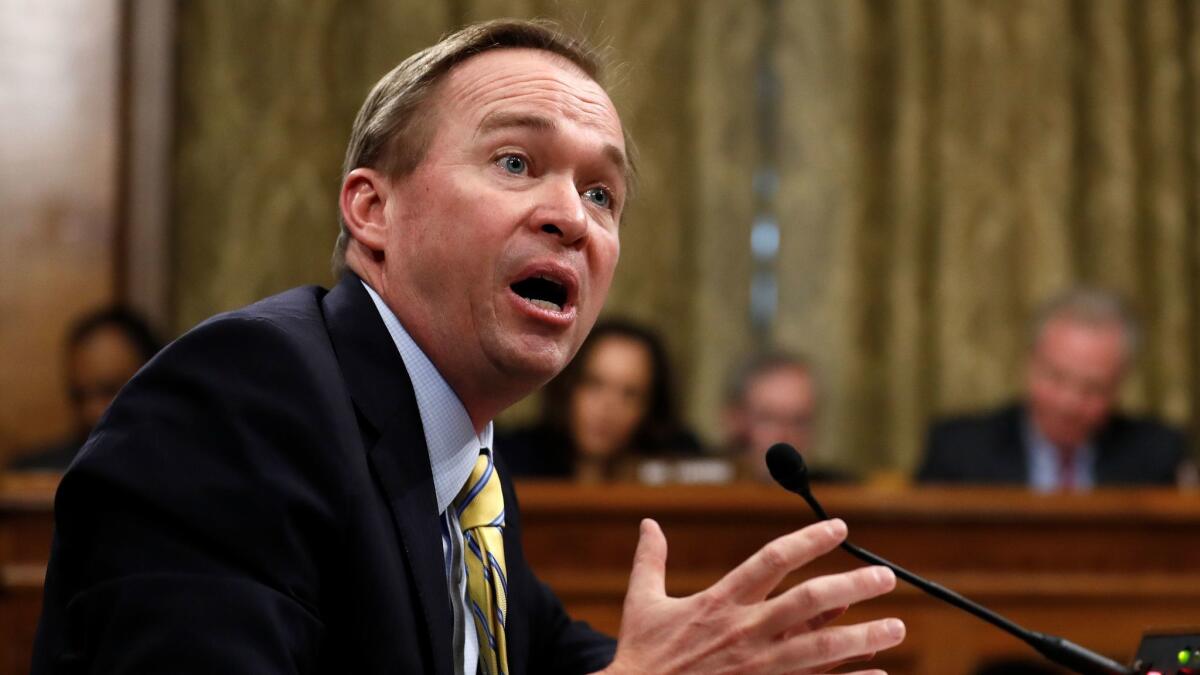Column: Politicians aiming to cut Social Security and Medicare use weasel words to hide their plans. Letâs call them on it.

In this era in which the Orwellian manipulation of language by politicians to say the opposite of what they mean has reached a fever pitch, we should be especially wary when conservatives hide their plans to cut Social Security and Medicare benefits behind a smokescreen of euphemism.
Jared Bernstein, a fellow at the Center on Budget and Policy Priorities and a former chief economist to Vice President Joe Biden, has put in a plea to journalists to call out policy makers when they pull this stuntâand not to empower politicians by doing the same thing.
âThough many policy makers want to cut these social insurance programs, they rarely say âcut,ââ he writes. âInstead, because the programs are so highly valued by recipients, policy makers say âreform,â âoverhaul,â âchange,â ârevamp,â and âfixâ the program. In the vast majority of these formulations, these verbs are euphemisms for cuts, and itâs very important for journalists to call them out as suchâŚ. Please stop the obfuscation. When policy makers are talking about cutting entitlements, call it like it is.â
Raise your hand if you think Americaâs problem is that we have too much income and health care security in retirement.
— Economist Jared Bernstein
We second the motion. Weâve been particularly wary of plans described as âfixesâ to Social Security and Medicare. As weâve observed, these are invariably âfixesâ in the same sense that one âfixesâ a cat. But several other such weasel words surfaced in coverage of the confirmation hearing for Rep. Mick Mulvaney (R-S.C.), President Trumpâs budget director-designate. NPR reported that Mulvaney âwants to overhaulâ Social Security, Medicare and Medicaid. CNN said that he âwants to overhaulâ the programs and believes they âneed revamping to surviveââa journalistic twofer!
Letâs not allow these euphemisms to obscure Mulvaneyâs true opinions about these programs. He proposes to raise Social Securityâs normal retirement age to 70 (it now tops out at 67 for those born in 1960 or later), and to means-test Medicare. These are benefit cuts any way you define them.
Mulvaney also has described Social Security as a âPonzi scheme,â a term he tried to evade during his Jan. 24 confirmation hearing. He said he was just trying to explain Social Securityâs cash flow, which âtakes money from people now in order to give money to people now.â Thatâs not a Ponzi scheme. Moreover, thatâs not a full and accurate description of Social Securityâs cash flow, which collects money from people now and banks some of it to provide benefits for people in the future. (Do we really want a budget director whose understanding of one of Americaâs most important fiscal programs is so vacuous?)
As Bernstein pointed out, politicians understand that Social Security and Medicare are beloved by Americans, and for good reason: They represent value for money. Both programs incur rock-bottom administrative costs while delivering more than a trillion dollars a year in benefits to tens of millions of American retirees and families.
Republicans and conservatives have plotted for decades to turn this flow of cash over to Wall Street via privatization. Financial firms would skim billions off the top, administrative costs would soar, and to make up for the diversion benefits would shrink. The promoters of these schemes canât tell the truth about this, of course, so they talk about âreforming,â ârevamping,â and âoverhauling,â as though theyâre dressing a crumbling old house with a new coat of paint.
As Kathy Ruffing, a consultant to the CBPP, points out, the group George W. Bush empaneled to put over his privatization scheme in 2001 was called the âCommission to Strengthen Social Security.â Luckily for millions of Americans whose retirements were saved when the effort failed, most people werenât fooled.
The privatizers and benefit-cutters havenât stopped trying. They still cloak their plans in the mantle of âreformâ and ârescue.â The House GOPâs latest package of proposed Social Security cuts, unveiled in December, was described by its sponsor, Rep. Sam Johnson (R-Texas), as a âplan to permanently save Social Security.â
Earlier this month, House Speaker Paul Ryan (R-Wis.) bragged on âCharlie Roseâ that he has been âthe Medicare reform guy in Congress for many years.â This is, once again, âreformâ as benefit-cutting. What Ryan proposes to do is replace traditional Medicare with a privatized program. Seniors would get a federal voucher to help them pay premiums charged by commercial insurance plans. (Ryan calls this system âpremium support,â another wolf-in-sheepâs-clothing euphemism.)
But since the value of the vouchers would rise slower than the rate of healthcare inflation and the costs of private insurance typically rise faster than those of Medicare, an ever-larger share of healthcare costs would land on seniorsâ shoulders. In 2011, when Ryan first proposed this change, the Kaiser Family Foundation calculated that by 2022, healthcare spending would consume roughly half of the typical 65-year-oldâs Social Security check, compared to only 22% under the existing Medicare system. Thatâs a benefit cut.
The notion underlying all these schemes is that American seniors and retirees have it too good, and can survive on less. Thatâs the ultimate deception. As Bernstein writes, âRaise your hand if you think Americaâs problem is that we have too much income and health care security in retirement. AnyoneâŚanyoneâŚBueller??â
Keep up to date with Michael Hiltzik. Follow @hiltzikm on Twitter, see his Facebook page, or email [email protected].
Return to Michael Hiltzikâs blog.



